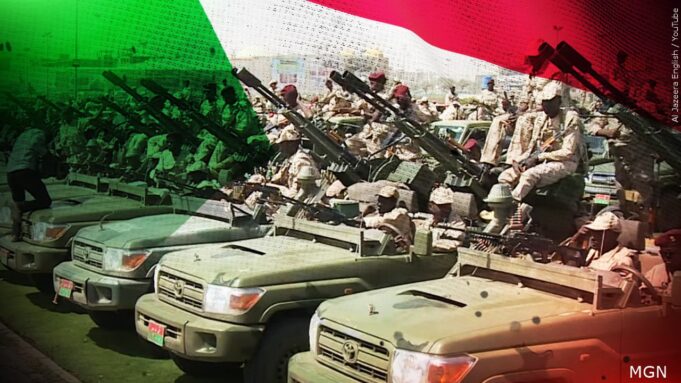At the root of Sudan’s ongoing conflagration between its two opposing militaries is regional power. Sudan is the “crossroad” between Africa and the Middle East. According to Khalil Ch arles, Sudan’s strategic value manifests itself in the region through connections in commerce, trade and culture.
As a research paper published by The Elliot School of International Affairs on pomeps.org reported, “After failing for years to decisively woo President Omar al-Bashir to their axis, the UAE (United Arab Emirates) and Saudi Arabia took advantage of the revolutionary uprising of 2018-2019 to bring Sudan under their influence.”
Charles, who is deputy news editor at TRT-World, Turkey’s English language 24-hour news service, said to Africa Watch, from his office in Istanbul, “Sudan is the conduit for where the Arab world (influence) stops.”
Post the 2019 overthrow of the regime of al-Bashir by General Abdul Fattah Al-Burhan, realignment with Gulf State countries was swift. Al-Burhan is the commander and chief of the military, who later became head of the country’s Sovereign Council and who joined forces with Mohamed Hamdan Daglo, also known as Hemedti, head of the Rapid Support Force (RSF) and who later became Deputy head of the Sovereign Council.
“Financial support from Saudi Arabia and the UAE (United Arab Emirates) gave the generals crucial leeway to resist popular demands for civilian rule, shaping a lopsided balance of power that allowed the generals to navigate a period of mass mobilization. The Emirates’ covert financial flows subsequently earned them unparalleled leverage across large segments of the political spectrum, which helped the generals, and in particular Hemedti, (a leader of the Darfur-based Janjaweed that morphed, with support of Al-Bashir into the paramilitary group called RSF) consolidate their power,” noted pomepw.org.
Charles’ wife is Sudanese and he once worked for Sudan’s government-controlled news service.
He believes the Arab-run monarchies, “royalty-run” governments and military-backed Egyptian government—now run by former General Abdel Fattah El-Sisi, who came to power by overthrowing a democratically elected government—“became the stopping point of anything that might lead to democracy and freedom.”
According to Charles, several MENA (Middle East, North Africa and South Asia) region powers, “are concerned and continue to be concerned if Sudan becomes a more democratic country. Additionally, he said if the civilian population decides to demand a civilian government “that’s going to be bad for the regional powers.” He added, “Particularly for Egypt, for the United Arab Emirates, and Saudi Arabia.”
In 2022 the Foreign Policy Research Institute noted in part that “the international community failed to adequately support Sudan’s civilian government during the key window of opportunity it had to gain the legitimacy of the Sudanese people.” Charles states that the Sudanese want “Europeans and United Nations-type revolutionaries,” who are calling for democracy. But the problem he said is, “They are not willing to put their money where their mouth is.”
Charles agrees with the Foreign Policy Research Institute which stated that from the beginning of its transition in July 2019, Sudan’s internationally constructed framework to transition from military rule to democracy was significantly flawed. “It enabled the military to hold onto most of the actual power for eighteen months while trusting that they would later relinquish that power into civilian hands.
All the while, civilians clamored for the military to be held accountable for corruption, put to justice over human rights abuses, and ousted from its dominant role in the Sudanese economy. In short, the military was being trusted to hand over power to the masses clamoring to rid the country of their systems of privilege. The result was predictable,” the institute noted.
The issue of the RSF integrating into the military is at the root of the most recent conflict. President El-Sisi, who encouraged the integration, and Burhan attended a military academy in Egypt together. So that relationship and calling for him to integrate his militia, more than likely caused Hemedti to see the handwriting on the wall.
“It was the Rapid Support Force’s unwillingness to integrate into Sudan’s military. The Egyptians told Hemedti that he needs to step back and he needs to integrate his RSF inside the army. So, the official verdict and the decision that was made was that the army would merge over a period of two years,” said Charles.
Hemedti’s counter was delaying the integration for 10-14 years, and during that period he’d only answer to whatever so-called civilian government under military control.
The RSF is battle-hardened from fighting for the Saudis and UAE in Yemen and Libya. The estimated 100,000 troops have never been a part of Sudan’s military. According to Charles, “About 45 percent of the RSF are not Sudanese.” He said they are from Chad and Niger. Charles added, “Not only would Hemedti’s RSF foreign troops have been removed during the integration process, but the force that remained would also be decimated.”
In his first speech since the conflict engulfed Sudan earlier in April, military chief Gen. Abdel Fattah Burhan pledged the military would prevail and secure the vast African nation’s “safe transition to civilian rule,” reported apnews.com. But for many Sudanese, including those this writer has spoken to in Khartoum and Omdurman, Burhan’s claim rang hollow 18 months after he joined forces with Hemedti to seize power in a coup that cast aside Sudan’s pro-democracy forces. Follow @JehronMuhammad on Twitter













